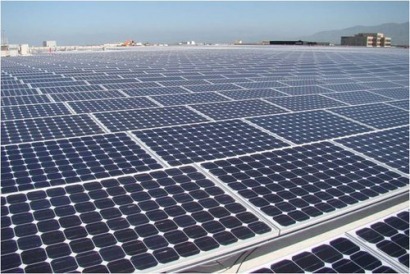
The UK Chancellor of the Exchequer, George Osborne, has angered green businesses and environmental groups throughout the country by announcing a budget that has given tax breaks to shale gas companies, praised nuclear power and increased exemptions from carbon taxes for industries that are heavy energy users. Energy as a whole was given only a meagre mention in the budget, scarcely a passage, which focused largely on creating a “generous new tax regime” for shale gas developers and selection of two new Carbon Capture and Storage (CCS) projects for the next round of development. The Chancellor also appeared to attack some subsidised sections of the green economy by stating that “creating a low-carbon economy should be done in a way that creates jobs rather than costing them.” He also said that good progress had been made with the approval of a new nuclear power station at Hinkley Point in Somerset.
The Chancellor made no reference to renewable energy or other clean technologies but he did praise shale gas as a ‘low carbon’ technology despite predictions from Ofgem and the International Energy Agency (IEA) that the success enjoyed by shale gas development in the US is unlikely to be repeated in the UK. The Chancellor’s support for shale gas invoked widespread condemnation among environmental groups with Greenpeace Executive Director John Sauven describing the announcement as “a 20th century budget for a 21st century economy”. “We got tax breaks for polluters and almost complete disinterest in the green economy, one of the only sectors that has consistently delivered jobs and growth in recent years.” Mr Sauven went on to add. “British businesses stand poised to become dominant forces in the global clean energy market, but they're being undermined by a chancellor who seems increasingly ill-suited to the times we live in. This man lacks a vision.”
The Solar Trade Association (STA) commented that it was very surprised to see no mention of green growth in the Chancellor’s budget speech given the contribution that the green economy is making to UK prosperity according to the CBI. Indeed, the speech could be interpreted as flying in the face of the Prime Minister’s statement last month that “making our energy sources more sustainable, our energy consumption more efficient, and our economy more resilient to energy price shocks – those are a vital part of the growth and wealth that we need.”
Leonie Greene, Head of External Affairs at the STA, said:“The Chancellor's fixation with old technologies flies in the face of mainstream evidence. The World Bank said last year that business as usual in the face of climate change presents an international crisis. Rising fossil fuel prices are impacting on inflation and household energy bills. Ofgem analysis shows a gas supply crunch is coming our way, increasing prices. For all these reasons, it is vital to divert energy infrastructure investment into renewables as quickly as possible.
“Renewable technologies like solar need bold leadership and a positive vision if we're to compete successfully in the global race the Prime Minister keeps highlighting” she added. “We’re on a path to nowhere if his Chancellor continues to ignore climate change, the economic potential of the green economy, and the dangerous upward trajectory of fossil fuel prices.”
Analysis by leading German experts has shown that solar power has a major role to play alongside wind in delivering a renewable power system. The price of solar has fallen by 70 percent over the past two years and will continue to fall until solar is competitive with the retail price of electricity and utility-scale solar power now receives 20 percent less subsidy than offshore wind. The STA was disappointed to see that there will be no freeze on business rates for solar power given that renewable projects generally pay higher business rates than fossil fuel plant on the basis that valuations of renewable energy reflect income from Renewable Obligation Certificates (ROC’s).
The budget also cites the Energy Bill as sufficient assurance for investors in renewable power despite the concern regarding Contracts for Difference (CfD). There will however be enhanced incentives for electric vehicles (EV’s) and a commitment to consult on zero carbon homes.
Further information:

